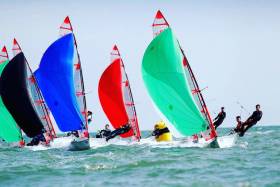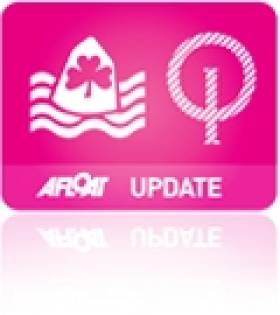Displaying items by tag: youth sailor
New 29er Fleet for Dun Laoghaire? Royal St. George Seeks Interested Youth Sailors for Skiff Venture
The Royal St. George Yacht Club in Dun Laoghaire, County Dublin is seeking youth sailors 'looking for a new challenge'.
RStGYC Sailing Manager Ronan Adams says a group of sailors are looking to form a 29'er fleet in Dun Laoghaire. The RStGYC has put a shout out to to see 'if anyone else might be open to a discussion as to the merits of this double hander class'
While Adams acknowledges 'the 29er is not supported/ recognised by the ISA as a pathway class', he says 'it most certainly does have its merits internationally' and also is a draw as ‘cool’ and fast/ fun boat for the age group mid-teens/ youths who sail it.
The Royal St. George's Tom Higgins has launched a new 29er campaign with Royal Cork's Harry Durcan as Afloat.ie reported previously.
One possible draw back is that the learning curve is very steep, vertical nearly but those that stick with it will be rewarded. Good second hand boats are in the region of €5k and are available in the UK, according to Adams.
RStGYC currently has two interested families and at least one in another waterfront Club in Dun Laoghaire who would like to meet other interested parties to discuss.
Expressions of interest or suggestions on whom to pass on the information are encouraged. The plan is to put all interested parties in touch with one another through email and see what happens.
email: [email protected] who are aiming to hold a meeting on Sept 10th or 17th. and have your say on Afloat's Facebook page. Here's what others have been saying:
Royal St. George Sailor Finishes Top Irish at Optimist EuroMed Regatta
#euromed2014 – The Royal St. George's Grace O'Beirne was the top Irish youth sailor at the Malta based Euromed 2014 Optimist championships held immediately before Christmas. Nine races were sailed with two discards In a series sailed largely in winds from five to ten knots that were shifty and gusty.
Unfortnuately, some of the Maltese series sailed at Mellieha Bay left a lot to be desired with only 13 finishers and 90 plus blackflag disqualifications in one afternoon on the water.
O'Beirne finished 14th with a seventh in race four as her best result. Next – in a team of 17 Irish sailors – was Michael Carroll in 33rd place. Full results here
The Irish ambassador to Malta, Mr Padraig MacCoscair was at Mellieha Bay to welcome all the Irish sailors off the water at Euromed 2014.






























































